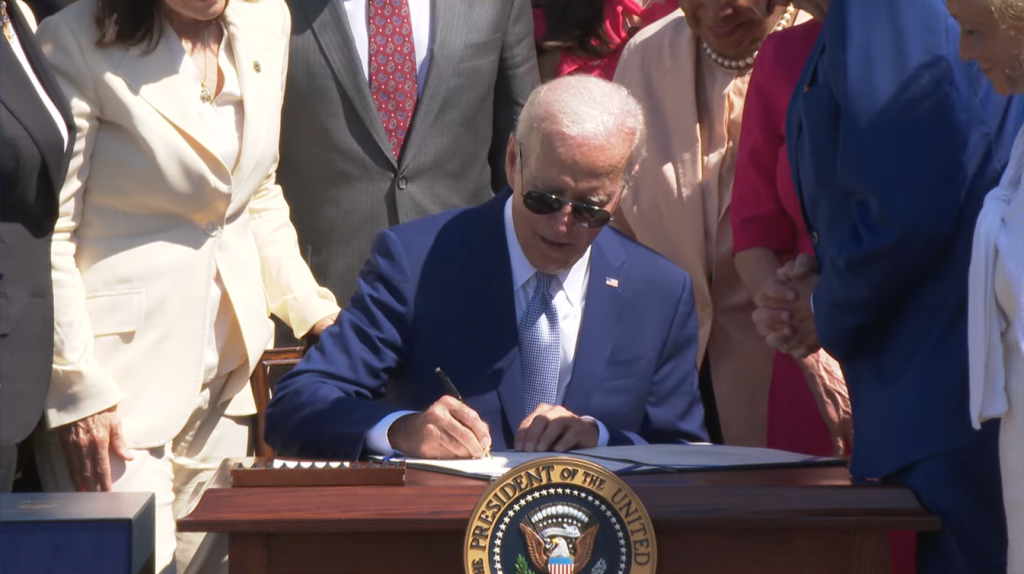Insider Brief:
A recent announcement from the National Quantum Initiative outlines the impact of The CHIPS and Science Act of 2022 on quantum, according to the National Quantum Initiative. The Act which President Biden signed recently, authorizes new investments in core quantum research programs that will encourage transformative and fundamental scientific discoveries. See the White House Fact Sheet.
The National Quantum Initiative efforts are designed to providing benefits to society while getting the science right, enhancing United States competitivenes, and enabling our people to participate in the opportunities created by this new field. Among other goals, National Security Memorandum on Quantum-Resistant Cryptography (NSM-10) codifies this strategy of accelerating U.S. R&D, critical partnerships and workforce development programs.
“This bill is about more than chips. It’s about science as well… It authorizes funding to boost our research and development funding… This increased research and development funding is going to ensure the United States leads the world in industries of the future, from quantum computing to artificial intelligence to advanced biotechnology. –President Biden

Full statement from the National Quantum Initiative:
Ensuring that the National Quantum Initiative provides benefits to our society requires getting the science right, enhancing United States competitiveness, and enabling our people to participate in the opportunities created by this new field. Among other goals, National Security Memorandum on Quantum-Resistant Cryptography (NSM-10) codifies this strategy of accelerating U.S. R&D, critical partnerships, and workforce development programs. The CHIPS and Science Act of 2022, which President Biden signed today, authorizes new investments in core quantum research programs that will encourage transformative and fundamental scientific discoveries. See the White House Fact Sheet.
The Act authorizes activities that (if appropriated) will accelerate the discovery of quantum applications, grow the quantum workforce, and enable cutting-edge R&D through new infrastructure:
Accelerating the discovery of quantum applications: Identifying and understanding how quantum technologies will benefit society is critical, and the Quantum User Expansion for Science and Technology Program will ensure researchers have access to leading edge quantum computing resources. Furthermore, the inclusion of quantum in the priority list for NSF’s new Directorate for Technology, Innovation, and Partnerships (TIP) will expedite the lab-to-market transition of emerging technologies such as quantum sensors.
Grow a diverse, domestic quantum workforce: The expansion of the Federal Cyber Scholarship-For-Service Program to include artificial intelligence and quantum computing will bolster the Nation’s cyber defense against threats from emerging technologies, while quantum’s addition to the DOE Computational Science Graduate Fellowship program will expand the current workforce. The NSF Next Generation Quantum Leaders Pilot Program authorized by this legislation, and which builds upon NSF’s role in the Q-12 Education Partnership, will help the Nation develop a strong, diverse, and future-leaning domestic base of talent steeped in fundamental principles of quantum mechanics, the science that underlines a host of technologies.
Development of critical infrastructure and standardization for enabling cutting-edge R&D: Quantum networks hold great promise for connecting the world in new ways that may enable new vistas of scientific research. This Act emboldens a coordinated approach to quantum networking R&D, while authorizing new, large-scale investments in the quantum networking infrastructure and R&D need to realize this bold vision. It also authorizes critical standards work and engagement.
The table below gives the authorized funding levels for specific quantum programs. Beyond this, quantum was identified as a core element of several authorized activities from the recapitalization of the Nanoscale Science Research Centers, to achieving computing systems with capabilities beyond exascale computing, and R&D for advanced communications technologies.
| Quantum-specific programs authorized by the CHIPS and Science Act | Lead Agencies | Annual Authorization of Appropriations | Timeframe |
| Quantum Science Network | DOE | $100,000,000 | 2023-2027 |
| Quantum User Expansion for Science and Technology Program | DOE | $30,000,000* | 2023-2027 |
| Quantum Networking and Communications Research and Standardization | NIST | $15,000,000 | 2023-2027 |
| Next Generation Quantum Leaders Pilot Program | NSF | $8,000,000 | 2023-2026 |
| Annual Authorized Investment | $153,000,000 |
In addition to these authorized programs, authorized funding for NSF TIP Directorate and appropriated funding for the CHIPS Act National Semiconductor Technology Center and associated investments in design, fabrication, packaging, and metrology for emerging technologies like quantum, will have profound impact on the infrastructure for quantum information technologies over the next decade.
*Increases by 1.05 % per year
For more market insights, check out our latest quantum computing news here.















